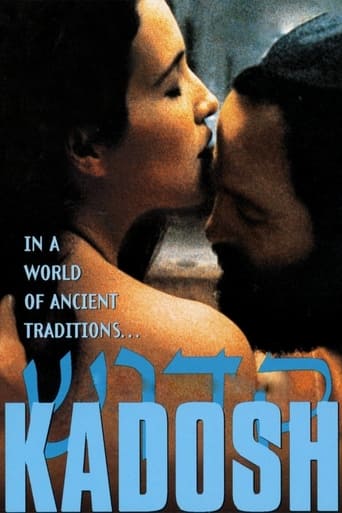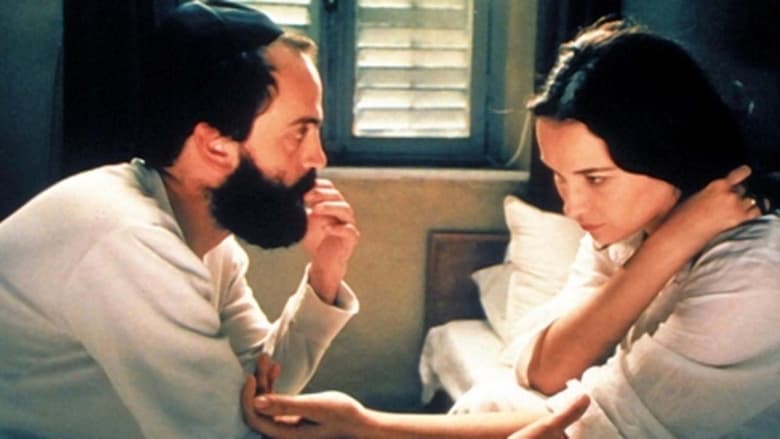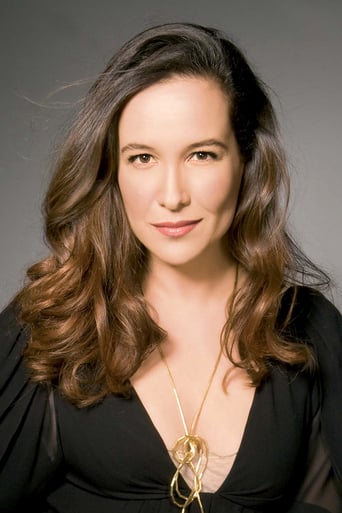

Kadosh (1999)
The year 2000 approaches in Jerusalem's Orthodox Mea Shearim quarter, where the women work, keep house, and have children so the men can study the Torah and the Talmud. Rivka is happily and passionately married to Meir, but they remain childless. The yeshiva's rabbi, who is Meir's father, wants Meir to divorce Rivka: "a barren woman is no woman." Rivka's sister, Malka, is in love with Yakov, a Jew shunned by the yeshiva as too secular. The rabbi arranges Malka's marriage to Yossef, whose agitation when fulfilling religious duties approaches the grotesque. Can the sisters sort out their hearts' desires within this patriarchal world? If not, have they any other options?
Watch Trailer
Cast


Reviews
'Kadosh' is a tragedy; the tragic hero is Meir, who is induced or forced to divorce his wife Rivka because she is barren for 10 years. A lesser tragic hero is his sister-in-law Malka, who is forced into a loveless marriage with the fanatic Yussuf, who beats her because she is deceptive and unfaithful. The main actors did great jobs--the love of the sisters at the end was amazingly portrayed. The point of the film--that ultra-orthodox Judaism is misogynistic--is made with considerable nuance if not balance, and the world of ultra-orthodoxy is explored intriguingly, if not always clearly for a non-Jew.I am writing this review mainly because of disdain for some other reviewers' defense of the ultra-orthodox practices and beliefs critiqued by this film. (Perhaps it needs saying that no, I'm not an anti-Semite--I even believe, despite my preference for separation of church and state, that a _Jewish_ state of Israel _needs_ to exist, as a haven from the deep-seated and contagious bigotry of other groups against Jews.) Reviewers complain that the film doesn't show the complexity or loving relations in ultra-orthodox families, and that it is biased toward secular or 'capitalist' (!) social currents.Now, in some ways, I agree: the film oversimplifies, and Yussuf is almost a caricature. (I never saw/heard a truck with loudspeakers extolling services during my short stays in Jerusalem or Tel Aviv, though I have--not extolling Jewish services--in Chicago.) Though I don't doubt for an instant that many powerful figures in religious and other institutions, in and out of Israel, are striking copies of him--for examples with less power, one need only turn on US talk radio. A work of art can be great and noble even though, and perhaps because, it makes characters overly simple and portrays actions unrealistically--I'll stop with 'Inherit the Wind' and 'To Kill a Mockingbird'.But talk about a secular or capitalist bias reveals the blindness of these reviews: no, the real contrast point to orthodox religion is individualistic democracy: the right of each member to be treated as basically equal, to choose their own beliefs and family practices (absent harm to others) without facing organized oppression, exclusion, or condemnation, and the requirement that important social institutions forswear bias and exclusion insofar as possible. A religion (or political party) that says blacks or gays or even women are second-class should face legitimate condemnation based on the clear evidence of history that it inevitably is rooted in fears and even more shameful emotions, and that it has soul-corroding consequences for everyone it involves.The problem with the negative reviews can be highlighted by comparing Kadosh with the recent film--'12 Years a Slave'. Defenders of slavery would surely complain that that film was very biased against the Southern plantation system, that many whites in it were caricatures, and that relations on Southern estates were complex, including lots of love and family warmth that nurtured blacks while ensuring that they fulfilled the important social function of producing more slaves to keep plantations going and free slave-owners for important cultural pursuits. I saw such arguments in the US even in the 1950s--vicious and ridiculous, surely, but more importantly they're beside the point--even if a social institution is a joy to the world, every human has the right to choose to oppose it, to live outside its norms if living so doesn't harm others, and every person has the right not to be brainwashed or mass-pressured into forgoing real alternatives to those institutions.
Judging from the number of comments, KADOSH seems to have received more international exposure than many better Israeli films have. I would hate to think that the reason is that KADOSH encourages the audience to feel superior to the Orthodox Jews, because as other comments have pointed out, the film misrepresents the lifestyle of Orthodox Jews in both big ways and small. I understand there is a tiny industry of ultra-Orthodox Jewish video dramas in Israel, and it would be interesting to see in contrast how these people portray themselves; but few outsiders are likely ever to see those productions because of their commercial appeal is nil. The portrayal of the ultra-Orthodox is left to well-intentioned distortions like THE SECRETS (a more recent Israeli film) and to viciously intended distortions like this one, in which the camera moves from a dead body to a shelf of Jewish books and a Jewish candelabrum as if to say "The blame lies here."
I don't read this film as a simple condemnation of the ultra-orthodox or the treatment of women in some of those communities. The male lead is an extremely empathic character who one cannot but sympathize with as his life is slowly (spoiler!) destroyed by the dictates of his faith - as conveyed by his absolute spiritual leader. The sweet marriage of two people who are very hard not to love, torn apart simply by that faith's dictate that a marriage must bear children, and the contrast with hollow dutiful insincere marriages, even the one the male lead is forced into with a stunning younger woman, makes the viewer ache for this pair to be free of the tyranny. But they're kept in it by their own conditioning, their own inability to question. The minimal but erotic contact with the secular Israeli society is compelling but it doesn't really make either world look that appealing.Is this typical of ultra-orthodox lives? I very much doubt it. Does it have something to say about faith and belief and the purpose of marriage and love? Absolutely.I think sympathetic portrayals of genuinely spiritual marriages in film are rare and often the depth of the bond is only hinted at (the scenes between Jessica Lange and Liam Neeson in Rob Roy come to mind). Here it is all there, and mostly in looks, in touches, in movements, and how the couple meets the dictates of their faith while simultaneously genuinely loving each other. It's a tightrope act, though, which ends in a fall - not their own, but after literally being pushed off that tightrope by a bullying "spiritual" leader whose faith is nothing compared to their own. The insincere formulaic ritualistic panic of some of the characters is almost comical. And again contrasts with the sincerity of the couple at the core of the story.The second time I saw this film, I wept at the beauty of the way they touched and loved each other in the beginning, knowing what would happen to them. I was surprised I could watch it all the way through a second time, so clearly are the emotions portrayed.This is close to being a masterpiece. I do not think there will be a film made that will portray a deeply religious couple and the way their faith and love can clash, anywhere, as well as this one does. Name one, if you can.
It is apparent that director, writers and everyone else knows nothing about their own religion or the people who practice it. This movie is endlessly flawed and overall a complete crock.For instance, there is a scene where the rabbi enters the woman's ritual bath while a naked woman is bathing, puts his hand on the head of a woman there and blesses her. This is complete mockery of the laws, in this scene alone some of the laws broken include: Modesty, a rabbi would never enter a ritual bath house while there are woman in it.Improper contact, a rabbi would never put his hand on a woman's head, not to mention that it is not the way a blessing is given.The woman from the ritual bath is dunking a naked woman by pushing her head under the water, the laws regarding ritual bathing require the entire body to make direct contact with the bath water; this means nobody should be in contact with the person bathing, certainly not pushing them under!There was more just in that scene alone, like dunking 13 times (where does that concept even come from?) not to mention the rest of the movie was a total fallacy. It is scary what ignorance can concoct!



